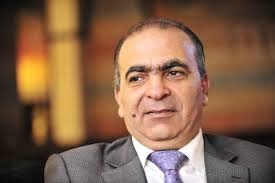Very few details about the recent Vienna talks have been made public as most attendees have largely avoided making statements on the progress of the negotiations, perhaps because most of the political and media attention was concentrated instead on the tragic events in Paris.
The press conference that was held by the foreign ministers of the United States and Russia, along with the UN envoy to Syria, Staffan de Mistura, did not suggest real progress had been made, as the main and fundamental disagreement remained, without which talk of a political solution in Syria is much ado about nothing.
What the two ministers claimed to have agreed upon was nothing more than the Russian plan that was leaked a few days ago and was categorically rejected by an overwhelming majority of Syria’s political and military opposition groups, as well as Saudi Arabia, Qatar and Turkey.
The talk of a solution carried out by Syrians themselves, as the two ministers said, is based on the formation of a national unity government (not a governing body with full executive powers, as previously stated in Geneva), followed by the adoption of a new constitution before conducting general elections, with participation from the internal and external Syrian opposition (under the authority of Assad and his security forces).
But this general view cannot be applied on the ground, just like the supposed willingness of the permanent Security Council members to issue a resolution supporting a cease fire, as agreed upon by all Syrian parties (who will not meet on the vague basis of the Vienna conference, and, if they did, will not agree in light of the gap between the supporters of the two parties).
These talks have exhibited these countries' clear abandonment of their responsibility to protect Syrian civilians and maintain the security and integrity of the members of the international community. If this cease fire fails to include the Islamic State, Nusra Front and other terrorist groups to be specified by the Vienna group, it would be rejected by the overwhelming majority of the militant factions, as they would consider the open list of terrorist organizations as a sword hanging over any opposition faction that rejects the Russian plan (a plan which aims to keep the tyrant Assad regime, flatly ignoring the primary goal that motivated the Syrian revolution).
The speech of the Russian and US ministers caused much frustration for many Syrians who had hoped the tragic events of Paris would embolden the international community to find solutions to the Syrian tragedy – a prelude necessary to unite the peoples of the region with the global efforts in the war against terrorism, not only in Syria but also In Iraq, Libya, Yemen and Egypt.
This could be done through the lifting of injustice, preventing Iran from deepening the sectarian strife in the region by arming and supporting sectarian militias in Syria, Lebanon, Iraq, and Yemen, and trying to dominate and conquer these communities, where the Iranian encroachment with its clear sectarian background leads the disaffected and miserable youth of these communities to join radical organizations.
The description given by the US Secretary of State regarding events in Syria was realistic, as he spoke of peaceful demonstrations faced by bullets, torture and abuse, as well as the negative role of Iran and the Lebanese and Iraqi militias fighting alongside Assad forces (which have been excluded from the terrorist organizations mentioned earlier), the nature of the Assad regime’s relationship with ISIS, and finally the crimes committed by this tyrant against his own people. But the plan, which the US foreign minister agreed to adopt with backing from his Russian counterpart, cannot be a solution to the problem that he himself described.
In the end, the fate of the Vienna conference will not differ from the fate of Geneva, which remains only in words and not deeds, and that shows the gap between the regional and international forces is still immense and no closer to being patched up.
The situation continues as it is now, and the US indifference and brutality of the Iranian and Russian aggression will lead to more destruction in Syria, and the deepening of sectarian strife – fueled by both Iran and its militias on the one hand, and the extremist organizations on the other side – which will only lead to further instability in the Middle East. This dilemma requires Syrians and Arabs and other regional countries to unite their efforts and send a unified message to the United States, Russia and the international community, that we will not accept this situation, and that we are serious in ending this mess, whatever it takes, because the fate of the region and its countries and peoples cannot be fuel for this destructive sectarian strife.
This article does not necessarily reflect the opinion of The Syrian Observer.


